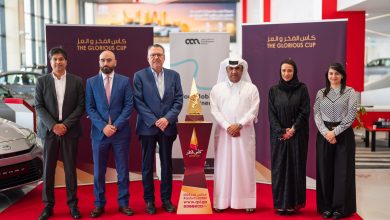Non-Energy Qatari Private Sector Companies’ Economy Expanded Rapidly Last July
اقتصاد شركات القطاع الخاص القطري غير المرتبط بالطاقة يواصل التوسع بوتيرة سريعة في يوليو الماضي
QNA
Doha: The latest Purchasing Managers Index (PMI ) survey data from Qatar Financial Centre (QFC) continued to signal rapid growth in the non-energy private sector in July. The rates of expansion in total activity, new work and outstanding business all eased slightly compared with June but were still among the fastest registered throughout the survey’s more than five-year history. Headcounts meanwhile rose marginally while sentiment moderated somewhat.
Positively for businesses, overall input prices fell slightly in July while firms continued to raise selling prices.
The Qatar PMI indices are compiled from survey responses from a panel of around 450 private sector companies. The panel covers the manufacturing, construction, wholesale, retail, and services sectors, and reflects the structure of the non-energy economy according to official national accounts data.
The headline Qatar Financial Centre PMI is a composite single-figure indicator of non-energy private sector performance. It is derived from indicators for new orders, output, employment, suppliers delivery times and stocks of purchases.
The PMI remained well within expansion territory in July at 61.5. This eased notably from June’s previous record high but was still among the strongest in the survey, which began in April 2017.
The two largest components of the PMI by weight new orders and output were behind the month-on-month dip in the headline figure in July. Output and new orders rose sharply, albeit at the softest pace for four and five months, respectively.
Wholesale & retail firms recorded the steepest increase in activity levels followed by manufacturing, construction and services.
With demand and output expanding rapidly in July, non-energy private sector firms in Qatar raised their workforces. Employment levels have now increased for 22 months in a row.
Robust demand conditions continued to exert pressure on capacity with backlogs rising moderately during the month. However, the rate of accumulation slowed notably from June, and was modest overall.
Sustained new order growth led firms in Qatar’s private sector to raise their buying activity. Purchases have now risen in each of the last 25 months with the latest uptick among the strongest in the survey’s history. Subsequently, stocks of inventories rose, albeit only moderately amid improving vendor performance.
On the price front, purchase prices increased at the softest pace in three months while overall input prices fell fractionally. Firms opted to raise selling prices at a softer pace, but at a rate that was still among the quickest in the survey’s history.
Firms remained optimistic that their output levels would improve over the coming 12 months amid the upcoming FIFA World Cup.
The latest Purchasing Managers Index (PMI ) survey data from Qatar Financial Centre (QFC) continued to signal rapid growth in the non-energy private sector in July. The rates of expansion in total activity, new work and outstanding business all eased slightly compared with June but were still among the fastest registered throughout the survey’s more than five-year history. Headcounts meanwhile rose marginally while sentiment moderated somewhat.
Employment at financial services firms rose marginally, although at a softer pace, while business expectations remained positive.
On the price front, average input costs at financial services firms rose marginally, and at the softest pace in the current eleven-month sequence of inflation. By contrast, prices charged for financials services fell moderately and at the quickest pace for 20 months.
For his part the Chief Executive Officer of QFC Authority Yousuf Mohamed Al Jaida said whilst commenting on the data by saying that despite correcting from record highs in May and June, latest PMI data pointed to continued strong performance in Qatar’s non-energy sector. Also, output and new orders expanded markedly, while headcounts rose once again. At the same time, delivery times improved at the greatest extent for over a year and firms were keen to purchase and store items.
In addition, positive news also came on the price front with overall input prices falling slightly in July. Robust demand conditions allowed firms to focus on their profits by raising their selling prices for the third month running. In fact, firms remained optimistic that their output levels would improve over the coming 12 months amid the upcoming FIFA World Cup.
It is noteworthy that the Qatar PMI indices are compiled from survey responses from a panel of around 450 private sector companies. The panel covers the manufacturing, construction, wholesale, retail, and services sectors, and reflects the structure of the non-energy economy according to official national accounts data.
In fact, the headline Qatar Financial Centre PMI is a composite single-figure indicator of non-energy private sector performance. It is derived from indicators for new orders, output, employment, suppliers delivery times and stocks of purchases.
Moreover, PMI studies now cover more than 40 major countries and regions, including the Eurozone, and PMIs have become the world’s most-followed studies, as well as a favorite of central banks, financial markets, and business decision makers. This is due to the studies ability to provide up-to-date, accurate and distinctive monthly indicators of economic patterns.
قنا
الدوحة: أشارت أحدث بيانات دراسة مؤشر مديري المشتريات التابع لمركز قطر للمال إلى نمو اقتصاد شركات القطاع الخاص القطري غير المرتبط بالطاقة بوتيرة سريعة في يوليو الماضي، لكنها أظهرت انخفاض معدلات النمو في مؤشرات النشاط الكلي والطلبات الجديدة والأعمال غير المنجزة بدرجة طفيفة في الشهر نفسه، مقارنة بمعدلات النمو في يونيو 2022.
ورغم ذلك ذكرت تلك الدراسة أن هذا النمو ظل من أعلى المعدلات المسجلة في تاريخ الدراسة التي بدأت قبل أكثر من خمس سنوات، وفي الوقت ذاته، ارتفعت أعداد الموظفين بدرجة طفيفة، بينما تراجع مستوى ثقة الشركات القطرية إلى حد ما.
وفي مؤشر إيجابي، قالت الدراسة : إن الأسعار الإجمالية لمستلزمات الإنتاج انخفضت بدرجة طفيفة في يوليو الماضي ، في الوقت الذي استمرت فيه شركات القطاع الخاص القطري غير المرتبط بالطاقة في رفع أسعار بيع سلعها وخدماتها.
وأوضحت أن المؤشر ظل ضمن مستوى النمو بتسجيله 61.5 نقطة في يوليو من هذا العام . وكانت هذه القراءة أدنى من القراءة القياسية المسجلة في يونيو الذي سبقه ، ولكنها ظلت من أعلى المعدلات المسجلة في تاريخ الدراسة التي بدأت في أبريل عام 2017.
وبينت أن مؤشري الإنتاج والطلبات الجديدة، وهما أكبر مكونين للمؤشر من حيث الوزن الإجمالي، يعدان العامل الرئيسي وراء الانخفاض الشهري في القراءة الرئيسية لمؤشر مديري المشتريات في يوليو 2022، حيث سجل مؤشرا الإنتاج والطلبات الجديدة ارتفاعا حادا، وإن بمعدل هو الأدنى منذ أربعة وخمسة أشهر على التوالي.
وأضافت أن شركات البيع بالجملة والبيع بالتجزئة سجلت أكبر ارتفاع في معدلات النمو، تبعتها شركات الصناعات التحويلية والإنشاءات والخدمات.
ونوهت إلى أنه في ضوء ارتفاع مستوى الطلب ومؤشر الإنتاج بوتيرة سريعة في يوليو الماضي ، زادت شركات القطاع الخاص القطري غير المرتبط بالطاقة أعداد موظفيها، وارتفع مؤشر التوظيف للشهر الثاني والعشرين على التوالي.
كما ساهم تحسن ظروف الطلب في استمرار ممارسة الضغط على القدرة الإنتاجية للشركات القطرية، وسجلت الأعمال غير المنجزة ارتفاعا طفيفا خلال شهر يوليو من هذا العام . فيما انخفض معدل تراكم الأعمال غير المنجزة بشكل ملحوظ في الشهر نفسه ، مقارنة بشهر يونيو الذي سبقه وكان معتدلا بوجه عام.
وقالت الدراسة: إن النمو المطرد في الطلبات الجديدة دفع شركات القطاع الخاص القطري غير المرتبط بالطاقة إلى تكثيف أنشطتها الشرائية، وارتفعت هذه الأنشطة للشهر الخامس والعشرين على التوالي، وكان الارتفاع الأخير من بين أعلى الارتفاعات في تاريخ الدراسة. ونتيجة لذلك، ارتفعت مخزونات الشركات من السلع الجاهزة ومستلزمات الإنتاج وإن بدرجة معتدلة في ضوء تحسن أداء الموردين.
أما بالنسبة للأسعار، فارتفعت أسعار الشراء بمعدل هو الأدنى في ثلاثة أشهر، بينما انخفضت الأسعار الإجمالية لمستلزمات الإنتاج بدرجة طفيفة، وقررت الشركات القطرية زيادة أسعار سلعها وخدماتها بمعدل طفيف، ولكنه ظل أحد أسرع المعدلات المسجلة في تاريخ الدراسة.
كما ظلت شركات القطاع الخاص القطري غير المرتبط بالطاقة واثقة من تحسن مستوى نشاطها خلال الاثني عشر شهرا المقبلة؛ بسبب تنظيم بطولة كأس العالم FIFA قطر 2022.
وأشارت بيانات دراسة مؤشر مديري المشتريات، التابع لمركز قطر للمال التي تغطي قطاع الخدمات المالية، إلى تسجيل نمو ملحوظ في النشاط التجاري للقطاع في شهر يوليو 2022، حيث ارتفع هذا النشاط بوتيرة أدنى، مقارنة بالأشهر الخمسة الأخيرة، ولكن كان معدل النمو فيه ملحوظا، مقارنة بالمتوسط التاريخي، وتماشيا مع اتجاه هذا النشاط ، انخفضت الطلبات الجديدة في قطاع الخدمات المالية إلى أدنى مستوى لها في خمسة أشهر، ولكنها ظلت عند مستوى قوي.
وسجلت معدلات التوظيف في شركات الخدمات المالية ارتفاعا طفيفا، وإن بوتيرة أدنى، بينما ظلت توقعات النشاط التجاري إيجابية.
أما بالنسبة للأسعار، فقد ارتفع متوسط أسعار مستلزمات الإنتاج في شركات الخدمات المالية بدرجة طفيفة وبوتيرة هي الأدنى في سلسلة التضخم الحالية التي استمرت أحد عشر شهرا. وفي المقابل، انخفضت أسعار الخدمات المالية بدرجة طفيفة وبوتيرة سريعة منذ عشرين شهرا.
ومن جهته قال السيد يوسف محمد الجيدة الرئيس التنفيذي لهيئة مركز قطر للمال، في تعليق له على هذه البيانات: “رغم انخفاضه من الارتفاعات القياسية في مايو ويونيو 2022، أشارت أحدث بيانات مؤشر مديري المشتريات إلى أن اقتصاد شركات القطاع الخاص القطري غير المرتبط بالطاقة حقق أداء قويا في يوليو الماضي . وسجل مؤشرا الإنتاج والطلبات الجديدة توسعا ملحوظا، بينما ارتفعت أعداد الموظفين مجددا، وفي الوقت ذاته، تحسنت مواعيد تسليم الموردين بأعلى معدل منذ أكثر من عام، وحرصت الشركات القطرية على شراء المواد ومستلزمات الإنتاج وتخزينها.
وظهرت بعض المؤشرات الإيجابية بشأن الأسعار، حيث انخفضت الأسعار الإجمالية لمستلزمات الإنتاج بدرجة طفيفة في يوليو 2022، وساعد تحسن ظروف الطلب الشركات القطرية في تعزيز هوامشها الربحية، من خلال رفع أسعار بيع سلعها وخدماتها للشهر الثالث على التوالي.. وكانت هذه الشركات واثقة من أن مستوى النشاط التجاري سينمو خلال الأشهر المقبلة، مع تنظيم كأس العالم FIFA قطر 2022.
يذكر أن تجميع مؤشرات مديري المشتريات لقطر يتم من الردود على الدراسة من لجنة تضم حوالي 450 شركة من شركات القطاع الخاص، وتغطي هذه اللجنة عدة مجالات تشمل الصناعات التحويلية والإنشاءات والبيع بالتجزئة والجملة إلى جانب الخدمات، كما أنها تعكس هيكل الاقتصاد غير المرتبط بالطاقة، وذلك وفقا لبيانات الحسابات الوطنية الرسمية.
ومؤشر مديري المشتريات الرئيسي التابع لمركز قطر للمال هو مؤشر مركب مكون من رقم واحد يشير إلى أداء شركات القطاع الخاص غير المرتبط بالطاقة في قطر، ويحتسب مؤشر مديري المشتريات الرئيسي لقطر على أساس مؤشرات الطلبات الجديدة والإنتاج والتوظيف، ومواعيد تسليم الموردين والمخزون من المشتريات.
وتغطي دراسات مؤشرات مديري المشتريات (PMI) الآن أكثر من 40 دولة ومنطقة رئيسية، بما في ذلك منطقة اليورو “Eurozone”، وقد أصبحت مؤشرات مديري المشتريات (PMI) أكثر الدراسات متابعة في العالم، كما أنها المفضلة لدى البنوك المركزية، والأسواق المالية، وصانعي القرار في مجالات الأعمال؛ وذلك لقدرتها على تقديم مؤشرات شهرية حديثة ودقيقة ومميزة للأنماط الاقتصادية.




